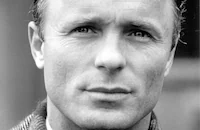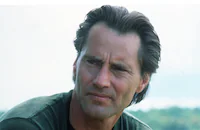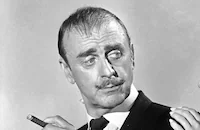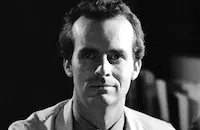The Right Stuff

Brief Synopsis
Cast & Crew
Philip Kaufman
Ed Harris
Scott Glenn
Barbara Hershey
Sam Shepard
Darryl Henriques
Film Details
Technical Specs
Synopsis
NASA recruits seven test pilots, training them to become astronauts for the Mercury Space Program in an attempt to surpass the Russian space program.
Director
Philip Kaufman
Cast

Ed Harris
Scott Glenn

Barbara Hershey

Sam Shepard
Darryl Henriques
The Philharmonia Orchestra Of London
Susan Kase
Eric Sevareid
Tom Dahlgren
Maureen Coyne

Fred Ward

John Dehner
Kim Stanley
Peggy Davis
Harry Shearer
Andrew Holt
I Fratelli Bologna

Scott Wilson
Mark Todd
James M Brady
Levon Helm
Jim Haynie
Kaaren Lee
Robert Elross

David Gulpilil
John Lion
Robert Beer
Eric Sevareid
Pamela Reed
Chuck Yeager
Sandy Kronemeyer
William Hall
Drew Eshelman
Frankie Di
Robert Geary
Christopher P Beale
Mary Apick
Veronica Cartwright
Charles Frank
William Russ

Jeff Goldblum
Ed Holmes
Alan Gebhart
Anthony Munoz
John X Heart
Kathy Baker
Erik Bergmann

Royal Dano
Ed Corbett
Scott Paulin
Wandjuk Marika
Mickey Crocker
John Ryan
Brian Djiliwuy Wanambi
Richard Dupell
Major Royce Grones
Mittie Smith
Drew Letchworth
Scott Beach
Michael Pritchard
Mary Jo Deschanel
Jack Tate
O-lan Jones
Donald Moffat
Anthony Wallace

Dennis Quaid
Edward Anhalt
Katherine Conklin
Paul Gurrumurruway

David Clennon
Banda Taurina
Jane Dornacker
Lance Henriksen
Crew
C J Appel
Joey Bacow
Stewart Barbee
Ted Bear
Jim Beebe
Jordan Belson
Louis Benioff
B Benjamin
Steph Benseman
John Benson
Mark Berger
Karen Bergman
Bumps Blackwell
Jay Boekelheide
Todd Boekelheide
Todd Boekelheide
Zac Bogart
Gloria S Borders
Karen Bradley
Kevin Breslin
William Browder
James D. Brubaker
James D. Brubaker
Valerie Bryce
Bill Buttfield
Dell Byrne
W Stewart Campbell
David Carothers
Robert Chartoff
Chubby Checker
Catherine Childers
Ted Churchill
Martha Cohen
Bill Conti
Robert Crawford
Susan Crutcher
Dan Curry
J Yvonne Curry
Paul Dal Parto
Joel David
Ray De La Motte
Rande Deluca
Craig Denault
Caleb Deschanel
Caleb Deschanel
Alan Disler
Don Dow
Craig Edgar
Rory Enke
Jonathan Fairbanks
John V. Fante
Glenn Farr
Rick Fichter
Lisa Fruchtman
Bruce Geller
Nancy Giebink
Vivien Hillgrove Gilliam
Vivien Hillgrove Gilliam
Gogi Grant
Whitney Green
Pat Grover
Gary Gutierrez
Jonathan Gutteres
Dr. Richard P Hallion
George Frederick Handel
Donald Hansard
Donald R Hansard
Carry Heflin
Karl Herrmann
Tim Holland
Jena Holman
Gustav Holst
Buddy Joe Hooker
Stephen A Hope
Vaughn Horton
Toni Howard
Garth Hudson
Richard Hymns
Pat Jackson
B D Johnson
L Dean Jones
Philip Kaufman
Pee Wee King
Geoffrey Kirkland
Peter Kleinow
Ned Kopp
Alex Kramer
Clay Lacy
Michael Lawler
Richard J Lawrence
Stan Lebowsky
Little Richard
Victor Livinoston
Jimmy Lloyd
J Logsdon
Michael Looney
Robert Evans Lowy
R B Macmillan
Louis Mahler
Jill Maley
Henry Mancini
Henry Mancini
Sharon Mann
John Marascalco
Robert Marty
Harry Mathias
Jo Ann May-pavey
V Mcalpin
Barbara Mcbane
Ned Mcclean
Ed Milkovich
Frank Morelli
Thaine Morris
Paul Murphey
Charles Myers
John Napolitano
Hiro Narita
Lawrence Nicanor Navarro
William Neil
George R. Nelson
Herb Newman
Genaro Nunez
Nancy Olexo
Seiji Ozawa
Patti Page
David Parker
David Parker
Stan Parks
Phil Pastuhov
Forrest G Patten
Diana Pellegrini
Pat Pending
Kenneth Pepiot
Rick Perkins
Emily Perry
Dave Pier
Gary Platek
Michael Polaire
Larry Powell
Patrick Ranahan
Bruce Richardson
Carl Richter
Tom Rolf
Peter Romero
Stephen Rotter
Tom Ruddock
Gene Rudolf
Art Scholl
Art Scholl
David Schwartz
Thomas Scott
Mark Selivan
Lynn Stalmaster
Del Stane
Kay Starr
Mark A. Stetson
Douglas Stewart
Redd Stewart
Joseph Leonard Svec
Zuzana Swansea
Seiichi Tanaka
Seiichi Tanaka
John Teton
The Flamingos
Randy Thom
Dennie Thorpe
Alice Tompkins
James W. Tyson
Ritchie Valens
Dan Wallin
Harry Warren
G D Weiss
Margaret Whiting
Joan Whitney
David Whorf
Winnie Brown Willis
Bob Wills
Duncan Wilmore
Karen Wilson
Irwin Winkler
Andy Wiskes
Tom Wolfe
Chuck Yeager
Photo Collections
Videos
Movie Clip





Film Details
Technical Specs
Award Wins
Best Editing
Best Editing
Best Editing
Best Editing
Best Editing
Best Score
Best Sound
Best Sound Effects Sound Editing
Award Nominations
Best Art Direction
Best Cinematography
Best Picture
Best Supporting Actor
Articles
The Right Stuff
If there's a real star of this sprawling piece of work, it's the title prototype, that certain something that enables a man to stare death in the eye while riding a roaring piece of machinery to the upper reaches of the atmosphere. The pilots and astronauts who possess this quality never talk about it- they just get the job done, precisely and stoically. The first part of the movie follows the cowboyish Chuck Yeager (Sam Shepard), as he romances his wife (Barbara Hershey) and ignores the deaths of his test pilot co-horts on the way to becoming the first man to break the sound barrier. Yeager, however, is deemed unsuitable for the space program(!), so he's left behind in the desert while less-accomplished (and, the government hopes, more cooperative) pilots are invited to train for eventual missions in space.
Just the thought of what the Mercury astronauts might do is enough to create a media frenzy. They're treated as heroes before they ever climb into a capsule, and they're fully aware of the irony. Kaufman mainly focuses on John Glenn (Ed Harris), Gordon Cooper (Dennis Quaid), Gus Grissom (Fred Ward), and Alan Shepard (Scott Glenn.) But Wolfe, much to his credit, recognized the importance of the astronaut's wives in this story. They, after all, display a different kind of stoicism, waiting at home for possible news that their husbands have perished in a ball of flame. Pamela Reed, as Gordon Cooper's quietly amused wife, Trudy, is one of the genuine standouts of this fine cast. (Glenn's wife, Annie, is played by Mary Jo Deschanel, the real-life wife of Kaufman's brilliant cinematographer, Caleb Deschanel.)
The narrative jumps back and forth between the astronauts training for their flights, then soaring into space, and Yeager maintaining his dignity while far less accomplished pilots and, at one point, a chimpanzee - are trumpeted around the world for their daring. Still, even with the smart-alecky attitude, Kaufman gives the astronauts their due. Glenn, in particular, is lauded for the bravery involved in his mission. His capsule's re-entry into the atmosphere is an electrifying highlight.
At first glance, The Right Stuff may look like just another patriotic epic, but don't be fooled. It's a truly unique picture. Kaufman seems more interested in examining how we perceive our heroes than he is in painting a realistic portrait of the pilots and politicians who teamed up to send men into space. When the movie was originally released back in 1983, most people, caught up as they were in Ronald Reagan's candy-coated view of America, didn't know what to make of it.
The Right Stuff went through an extensive, fairly painful gestation period, as detailed in screenwriter William Goldman's popular book, Adventures in the Screen Trade. Goldman, who also wrote Butch Cassidy & the Sundance Kid (1969) and All the President's Men (1976), argued that Yeager's story should be dumped in favor of focusing solely on the astronauts. Kaufman strongly disagreed and ended up writing his own adaptation of the novel. It's debatable who was right in this standoff, which Goldman termed "a nightmare." Kaufman's story does seem rather disjointed, but Yeager's chase of the elusive sound barrier contains some incredibly thrilling sequences, and his courage stands as a working definition of "The Right Stuff." What the movie loses in steam, it gains in impact through the inclusion of his exploits.
Kaufman also played fast and loose with his casting. Shepard was better known as an award-winning playwright - Harris, as a matter of fact, made a big splash in 1983 in Shepard's play, True West - when he was signed on for the pivotal role of Yeager. (You should also keep an eye open for a cameo by the real Yeager, as a bartender who offers Shepard a shot of whiskey.) Jack Ridley, Yeager's partner-in-crime, both in the air and on the ground, is played by Levon Helm, the drummer for the profoundly influential rock band, The Band. Helm and Shepard traveled in the same circles long before this movie was made. Levon played drums behind Bob Dylan during a couple of legendary 1970s tours, and Shepard was a part of Dylan's Rolling Thunder Review, in 1975. He, too, played the drums.
Somewhat oddly, when you consider how playfully audacious it is, The Right Stuff's initial notoriety hinged on Kaufman's treatment of John Glenn. Glenn, who was then a straight-arrow senator from the state of Ohio, was pursuing the presidency when the picture debuted. Many people thought it would give him an unfair advantage in the campaign, but it didn't help much: he was basically trounced in the primaries, just as the film was at the box office.
Directed by: Philip Kaufman
Screenplay: Philip Kaufman (based on the book by Tom Wolfe)
Producer: Robert Chartoff and Irwin Winkler Cinematography: Caleb Deschanel
Editing: Glenn Farr, Lisa Fruchtman, Stephen A. Rotter, Douglas Stewart, and Tom Rolf
Music: Bill Conti Production Design: Geoffrey Kirkland
Art Design: Richard Lawrence, W. Stewart Campbell, and Peter R. Romero Special Effects: Gary Gutierrez and Jordan Belson Principal Cast: Sam Shepard (Chuck Yeager), Scott Glenn (Alan Shepard), Ed Harris (John Glenn), Dennis Quaid (Gordon Cooper), Fred Ward (Gus Grissom), Barbara Hershey (Glennis Yeager), Veronica Cartwright (Betty Grissom), Pamela Reed (Trudy Cooper), Lance Henriksen (Wally Schirra), Donald Moffat (Lyndon B. Johnson), Levon Helm (Jack Ridley), Mary Jo Deschanel (Annie Glenn).
C-193m. Letterboxed.
by Paul Tatara

The Right Stuff
Quotes
Trivia
Miscellaneous Notes
Released in United States Fall October 21, 1983
Released in United States October 2000
Released in United States May 2003
Shown at Tribeca Film Festival (Special Screenings) May 3-11, 2003.
Released in USA on video.
Released in United States Fall October 21, 1983
Released in United States October 2000 (Shown at AFI Fest 2000: The American Film Institute Los Angeles International Film Festival (Tribute) October 19-26, 2000.)
Released in United States May 2003 (Shown at Tribeca Film Festival (Special Screenings) May 3-11, 2003.)
Released in United States October 1983
Released in United States October 1983













